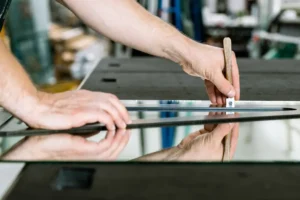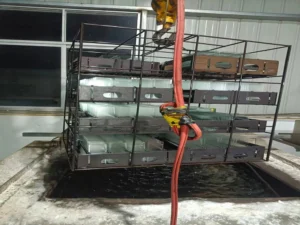Why do you need the glass types? Regarding smartphone or automobile mirrors, glasses stand out as the best components. But shattering into pieces is the most significant problem you come across.
To dominate and change the features in each glass type, we have come across two major glass types. One is the tempered glass, while the other is the chemically strengthened glass. Today, we will shed light on the comparison and explain which glass type is the most suitable for your applications.
What is glass tempering?

Glass tempering harnesses the high heat to strengthen the glass and make it more robust. It involves heating the glass at 600-700°C and then rapidly cooling the glass. The outer glass layer solidifies first on the cooling, preventing the internal layer from shrinking. As a result, high compressive stress causes the glass to strengthen better. It is stronger than other types of glass such as annealed glass and other types.
Features of Tempered Glass
Tempered glass comes with various features and empowers the whole system. These include:
- Increased strength
Compressive stress elevates strength. A tempered glass is 4-5 times stronger than annealed glass.
- Safety
What if your Tempered Glass falls on the ground? Don’t worry; it is not a risky case, as the tempered glass produces small pieces that are less likely to harm you.
- Heat resistance
Since heat is the primary component in manufacturing this glass type, it is resistant to heat. Reaching a higher temperature can’t shatter this glass into pieces.
What is the chemical strengthening of glass?

Instead of heating and creating the compressive stress among the molecules, we have another method related to the glass. It is the chemical strengthening that believes in the ion exchange.
For example, glass pieces are dipped into the molten potassium salts in chemical strengthening. A bath in potassium replaces the sodium ions with the potassium and enhances the strength of the glass products. Due to the ion exchange phenomenon, this process is called the chemical strengthening of glass.
Features of Chemical strengthened glass.
Chemically strengthened glass is robust and makes a mark in the following aspects.
- High scratch resistance
If you scratch the glass with a hard surface, it doesn’t create the scratch marks. It is even more resistant to scratches than tempered and annealed glass.
- Strength
Chemical glass is more potent than tempered glass in terms of surface compression.
- Flexibility in shape and form
Create thin sheets of glass or a complex structure of the glass. This is possible only with chemically strengthened, not tempered glass.
Glass tempering vs Chemical strengthening; 6 Fundamental differences
Glass tempering is a pretty different process compared to chemical strengthening. However, the goal is to strengthen the glass and make it more suitable for stressful applications. Let’s scroll down the various features and comparisons of both glass types.
Process
Glass tempering and chemical strengthening both involve different aspects of processes.
- Glass tempering comes with high-temperature heating. The temperature can teach up to 700°C followed by rapid cooling.
- In chemical strengthening, heating is replaced by ion exchange. Instead of heating, the glass takes a bath in the potassium solution. It leads to elevated strength as potassium is a more robust and strengthened material compared to sodium ions.
Strength
Strength can be a decisive factor if you are looking for the top features like scratch resistance.
- Tempered glass is more resistant to scratches. But there is a limited fact here. The scratch resistance is limited only to the external layer of the material, not the internal one.
- Chemical glass is more powerful and resistant to scratches. It is even less likely to break upon the application of force. However, this is uniform for all the layers. Internal to the external surface layer, all possess extreme strength and resist breaks.
Breakage pattern
Do you want to keep yourself safe when the glass breaks into pieces? There is a possible solution— get a glass that breaks into the small pieces, not the large and dangerous ones.
- Tempered glass breaks into small and blunt pieces. Such small pieces are harmless and don’t cause trouble to anyone.
- Chemical glass is risky in this case. It breaks into large and blunt pieces. Placing your foot or hand can cause damage to your body.
Glass Thickness
Thick or thin glass; what do you choose? Various applications require a different range of glass thickness. Display glasses have a thinner structure, while windows require thick glass.
- Tempered glass is suitable for thick glass. A thicker glass can do wonders since it offers external surface strength more than internal.
- Chemical glass has equal strength internally and externally. You can create thin glass sheets without worrying about the strength as they remain equally effective.
Optical Quality
The optical quality of glass materials can take its place in various applications. For example, the users can enjoy a high clarity glass on the display screens.
- Tempered glass doesn’t retain optical clarity after the heating and cooling process. It is due to temperature applications.
- Chemical Glass maintains its original clarity even after the ion exchange. Such a magical power makes it an ultimate solution for the users.
Applications
Both glass types have a different range of applications. Consider them:
- Tempered glass suits architectural applications, automotive windows, shower doors, and other relevant safety glass applications.
- Chemical glass makes a place in advanced applications, such as smartphone screens, camera lenses, and aerospace components.
Conclusion
Whether you are looking for chemical or tempered glass, you must find customized glass manufacturers. Look around and assess the quality of glass before jumping into the types. Understand the market conditions as well.
Shenxun Glass Manufacturers can be your ultimate choice for customized glass types. You can harness each process extremely accurately, from Glass sheets to CNC machining. Contact our experts now!
